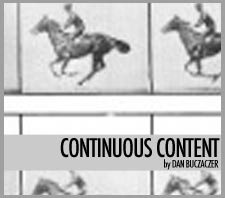Why Turntable is the Future of Music
Posted by Dan Buczaczer | July 14, 2011Music and social media were surely destined to be together. Music is just way more fun when it’s shared. The perfect summary of this is the . We love digging the same stuff, arguing over tastes, showing off just how musically savvy we are. Turntable is the first music site that gets this right and does High Fidelity one better: it kicks out that smug asshole behind the counter and puts the record decks in the hands of everyone. Play with Turntable a bit and you’ll soon realize this is a quantum leap forward in the quest to capture the real essence of being a music fan online.
It’s a quest that has been afoot since the web got 2.0’d and, in my opinion, can be split into 3 waves. Fan sites and MySpace helped change the game of music online in the first wave of social music sites. Suddenly there was a chance to comment on your favorite music with fellow fans, reach artists more directly and possibly even help shape who makes it big. Internet radio was just coming on the scene and you could easily hear programmers with much broader tastes than the evil overlords at Clear Channel Corp Inc. Radio looked like it was in trouble.
Then came a second wave of music sites organized around the crucial premise that you are what you play. Sites like Last.fm and Blip made recommendations based on what you played but, perhaps more importantly, streamed that list of what you were playing to other people. It was a chance to show off a bit. (See what I did right there? I went Junior Mervin’s “Police and Thieves” into The Clash’s “Police and Thieves” into DC Hardcore punk band Police & Thieves). This should have been compelling but, in reality, wasn’t. The playlist itself isn’t the exciting part. All of them missed that essential magic of sharing what you love most about music. Not just track names and band knowledge but the ACTUAL moment of awakening when you hear something new and brilliant and you’re with the person who is playing it (either physically or virtually but certainly in real time). “Right there. Did you hear that little horn riff? Amazing!”
That is what Turntable does – marries that High Fidelity insight with an experience similar to the Xbox Live lobby – you can see where your friends are, what game they’re playing and just hop in and join the fun yourself. Now, music is totally democratized. Even Pandora seems autocratic in comparison. Don’t like what’s being played? Jump to another room. There are a good number of packed rooms but also a seemingly endless list of rooms with 10-20 people in them. There it’s relatively easy to step up and take your turn as DJ. Or better yet: start your own room. You get your turn at the turntables and then you get to hear what others have to play. There are avatars so you can see your friends visually represented. There are Awesome and Lame buttons to show appreciation and give immediate feedback. A whole sea of bobbing heads means you’ve chosen a killer track (or maybe it means you’ve sold out and gone mainstream depending on the room).
The IM tool in the lower right of Turntable takes on real meaning because you aren’t just talking about music – you’re playing it at the same time. Anything you want. It reminds me of my buddies and me reuniting on the road to Coachella every year, taking turns plugging our iPods into the car stereo to DJ a set as we catch up. This idea of real-time music-fueled conversation can grow an incredible number of ways. Diplo has already shown up in a room to debut new tracks. Mashable and other companies have hosted mixers in their own room. There has been at least one live Turntable club dance party. You can easily imagine the ability to buy and download entire playlists coming soon. If radio was in trouble before, it’s surely dead for good now.
Pandora just announced two days ago that they will be adding social network functionality to their service. It seems to be their frantic attempt to create the sort of instant community that has flourished on Turntable and justify that enormous IPO valuation. But it won’t work. Because people want to build their own experience in social and Turntable shows us that, when music is involved, that means taking over the airwaves too.
Leave a Comment
RSS feed for comments on this post · TrackBack URI


